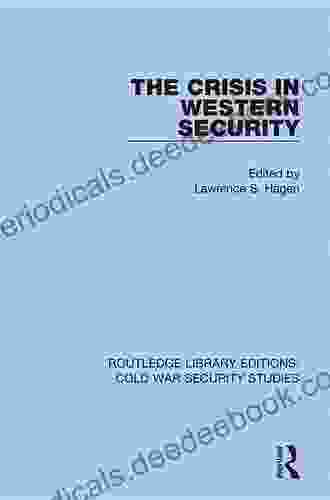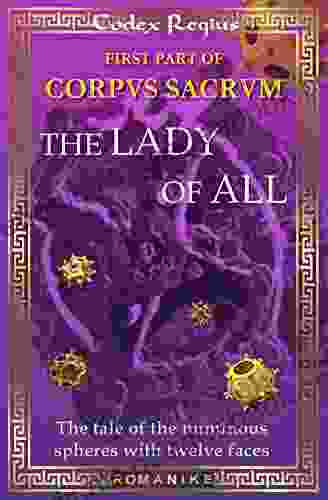Soviet Nationalities in Strategic Perspective: Resolving Nationalism, Revolution, and Empire

The Soviet Union was a multinational state, comprising over 100 different ethnic groups. The relationship between the Soviet state and its constituent nationalities was complex and often fraught with tension. This book examines the Soviet nationalities question from a strategic perspective, arguing that the Soviet state sought to resolve the tensions between nationalism, revolution, and empire by adopting a policy of "divide and rule." This policy involved pitting different nationalities against each other, and playing off their competing interests to maintain control. 4.2 out of 5 The book provides a detailed analysis of the Soviet nationalities policy, and its impact on the development of the Soviet Union. It begins by examining the origins of the Soviet nationalities policy, in the writings of Marx, Engels, and Lenin. It then traces the development of the policy under Stalin, Khrushchev, and Brezhnev. Finally, it assesses the impact of the nationalities policy on the collapse of the Soviet Union. The book argues that the Soviet nationalities policy was a fundamentally flawed attempt to resolve the tensions between nationalism, revolution, and empire. It argues that the policy failed to address the legitimate aspirations of the Soviet nationalities, and instead served to alienate them from the Soviet state. Ultimately, the book concludes that the Soviet nationalities policy was a major contributing factor to the collapse of the Soviet Union. The origins of the Soviet nationalities policy can be traced back to the writings of Marx and Engels. Marx and Engels believed that the nation-state was a product of capitalism, and that it would eventually be superseded by a classless, stateless society. They argued that the national question was a secondary issue, which would be resolved as part of the broader socialist revolution. Lenin developed Marx and Engels' ideas on the national question. He argued that the national question was a complex and multifaceted issue, which could not be reduced to a simple class struggle. He recognized the importance of national self-determination, but he also argued that it was necessary to balance the rights of nations with the interests of the working class as a whole. The Soviet nationalities policy was developed in the early years of the Soviet Union, under the leadership of Lenin. The policy was based on the principle of self-determination for all nations. This principle was enshrined in the Soviet constitution, which guaranteed the right of all nations to secede from the Soviet Union. However, the Soviet government also recognized the need to maintain a strong and unified state. In order to achieve this, the government adopted a policy of "divide and rule." This policy involved pitting different nationalities against each other, and playing off their competing interests to maintain control. The Soviet nationalities policy underwent a significant change under Stalin. Stalin was a strong believer in the importance of a centralized state, and he saw the national question as a threat to Soviet unity. He argued that the Soviet Union was a "multinational state," and that the interests of the Soviet state as a whole should take precedence over the interests of individual nationalities. Under Stalin, the Soviet government adopted a policy of Russification. This policy involved promoting the Russian language and culture at the expense of other national cultures. The government also suppressed nationalist movements and deported entire nationalities to Siberia and Central Asia. Stalin's policies led to widespread resentment among the Soviet nationalities, and played a major role in the collapse of the Soviet Union. After Stalin's death, the Soviet nationalities policy underwent a slight thaw under Khrushchev and Brezhnev. Khrushchev and Brezhnev recognized the need to address the concerns of the Soviet nationalities, and they adopted a policy of "national harmony." This policy involved promoting economic and cultural development in the non-Russian republics. However, the Soviet government continued to suppress nationalist movements, and the Russification policy remained in place. Despite the Soviet government's efforts to promote national harmony, tensions between the nationalities continued to simmer. In the late 1960s and early 1970s, there were a number of nationalist uprisings in the non-Russian republics. These uprisings were suppressed by the Soviet government, but they demonstrated the growing dissatisfaction with the Soviet nationalities policy. The Soviet nationalities policy played a major role in the collapse of the Soviet Union. The policy failed to address the legitimate aspirations of the Soviet nationalities, and instead served to alienate them from the Soviet state. The Russification policy, in particular, created a deep sense of resentment among the non-Russian nationalities. In the late 1980s, the Soviet Union began to experience a wave of nationalist uprisings. These uprisings were led by nationalist movements that had been repressed by the Soviet government for decades. The Soviet government was unable to suppress these uprisings, and the Soviet Union collapsed in 1991. The Soviet nationalities policy was a fundamentally flawed attempt to resolve the tensions between nationalism, revolution, and empire. The policy failed to address the legitimate aspirations of the Soviet nationalities, and instead served to alienate them from the Soviet state. Ultimately, the Soviet nationalities policy was a major contributing factor to the collapse of the Soviet Union. The Soviet Union's experience with the national question provides a cautionary tale for other multinational states. It demonstrates the dangers of trying to suppress nationalism, and the importance of respecting the rights of all nations.Language : English File size : 127257 KB Screen Reader : Supported Print length : 284 pages The Origins of the Soviet Nationalities Policy
The Soviet Nationalities Policy under Stalin
The Soviet Nationalities Policy under Khrushchev and Brezhnev
The Impact of the Soviet Nationalities Policy on the Collapse of the Soviet Union
4.2 out of 5
| Language | : | English |
| File size | : | 127257 KB |
| Screen Reader | : | Supported |
| Print length | : | 284 pages |
Do you want to contribute by writing guest posts on this blog?
Please contact us and send us a resume of previous articles that you have written.
 Book
Book Novel
Novel Chapter
Chapter Text
Text Reader
Reader Library
Library Paperback
Paperback Magazine
Magazine Sentence
Sentence Bibliography
Bibliography Foreword
Foreword Preface
Preface Synopsis
Synopsis Annotation
Annotation Scroll
Scroll Codex
Codex Tome
Tome Bestseller
Bestseller Classics
Classics Library card
Library card Biography
Biography Autobiography
Autobiography Memoir
Memoir Encyclopedia
Encyclopedia Thesaurus
Thesaurus Character
Character Librarian
Librarian Catalog
Catalog Stacks
Stacks Study
Study Research
Research Scholarly
Scholarly Lending
Lending Reserve
Reserve Journals
Journals Reading Room
Reading Room Storytelling
Storytelling Awards
Awards Book Club
Book Club Theory
Theory T L Toma
T L Toma Jason Brennan
Jason Brennan Tochi Onyebuchi
Tochi Onyebuchi The Great British Sewing Bee
The Great British Sewing Bee Sasscer Hill
Sasscer Hill Luanne G Smith
Luanne G Smith Denis Rothman
Denis Rothman Edward D Mansfield
Edward D Mansfield N R Hairston
N R Hairston Mel Bay
Mel Bay Dan Dye
Dan Dye Robert Fabbri
Robert Fabbri Lara Adrian
Lara Adrian John Kingston
John Kingston Ruth Kelly
Ruth Kelly Michael Tavon
Michael Tavon Lynn Romaine
Lynn Romaine Jeffrey C Hooke
Jeffrey C Hooke Kenneth Dennis
Kenneth Dennis Wendy Mass
Wendy Mass
Light bulbAdvertise smarter! Our strategic ad space ensures maximum exposure. Reserve your spot today!

 Bruce SnyderFun With Folk Songs: A Timeless Journey Through History, Culture, and Emotion
Bruce SnyderFun With Folk Songs: A Timeless Journey Through History, Culture, and Emotion
 Felix CarterPineal Region Lesions Management Strategies and Controversial Issues: Delving...
Felix CarterPineal Region Lesions Management Strategies and Controversial Issues: Delving... Terry BellFollow ·11.1k
Terry BellFollow ·11.1k Fletcher MitchellFollow ·10.6k
Fletcher MitchellFollow ·10.6k William FaulknerFollow ·5.7k
William FaulknerFollow ·5.7k Richard WrightFollow ·16.3k
Richard WrightFollow ·16.3k Walt WhitmanFollow ·17.9k
Walt WhitmanFollow ·17.9k Dylan MitchellFollow ·8.7k
Dylan MitchellFollow ·8.7k Ernest PowellFollow ·7.1k
Ernest PowellFollow ·7.1k W.B. YeatsFollow ·17.8k
W.B. YeatsFollow ·17.8k

 Anton Chekhov
Anton ChekhovClarinet Fundamentals: A Systematic Fingering Course for...
Welcome to the exciting world of...

 Gage Hayes
Gage HayesSea Prayer: A Haunting and Heartbreaking Story of...
Sea Prayer, the latest...

 Henry Green
Henry GreenPillars of Society Rosmersholm Little Eyolf When We Dead...
Henrik Ibsen, the towering...

 Robert Reed
Robert Reed10 For 10 Sheet Music Classical Piano Favorites: A...
Learning to play the...
4.2 out of 5
| Language | : | English |
| File size | : | 127257 KB |
| Screen Reader | : | Supported |
| Print length | : | 284 pages |












